Abstract
Aversive side effects are commonly associated with potentially curative chemotherapy treatments. Despite the advances in the development and testing of antiemetic medication, nausea and vomiting remain prevalent and troublesome side effects of chemotherapy. Four studies (from 1978-1990) of 2,499 consecutive cancer patients being treated with a variety of chemotherapy agents showed that 62-72% were experiencing posttreatment nausea/vomiting despite the use of available antiemetic medication. In addition to occurring during, or up until days following, treatment with cytotoxic drugs, nausea and vomiting may begin to occur in anticipation of chemotherapy treatments. This phenomenon is called anticipatory nausea and vomiting (ANV) and it occurs in at least one in four patients. Randomised clinical trials have shown that antiemetic drugs do not control ANV once it has developed. No single clinical or patient variable has been found to be as significantly associated with the development of ANV as several in concert. We have examined the predictive value of eight clinical characteristics in a series of three clinical trials. The first of these trials was developmental; the other two have been longitudinal prospective trials. The eight clinical characteristics appear stronger in predicting those patients who will not subsequently develop ANV rather than those who will. Anxiety has been proposed as a mechanism in the development and expression of anticipatory side effects. Here we show an association (P < .05) between patient self-report of anxiety on the State-Trait Anxiety Inventory (STAI) and the Symptom Checklist-90 (SCL-90) assessed at the first chemotherapy treatment, and subsequent development of anticipatory side effects within the first five treatments.(ABSTRACT TRUNCATED AT 250 WORDS)
Full text
PDF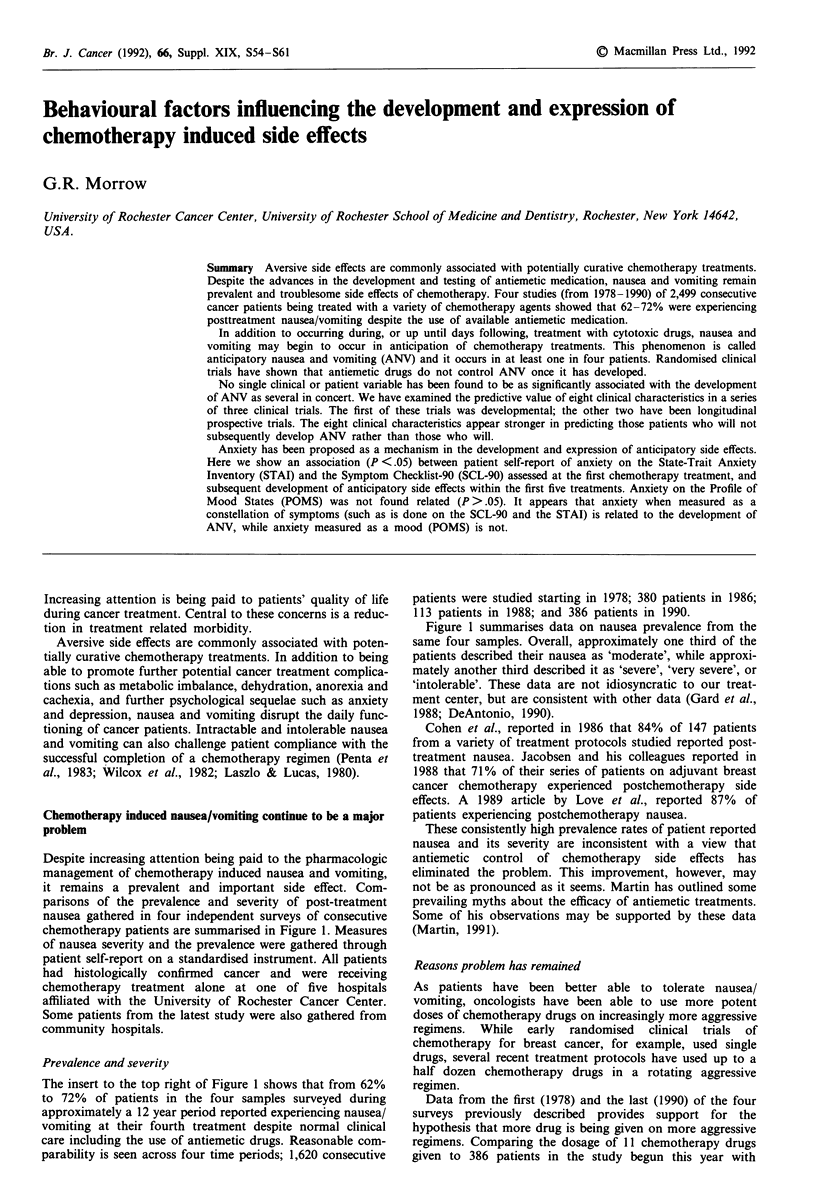
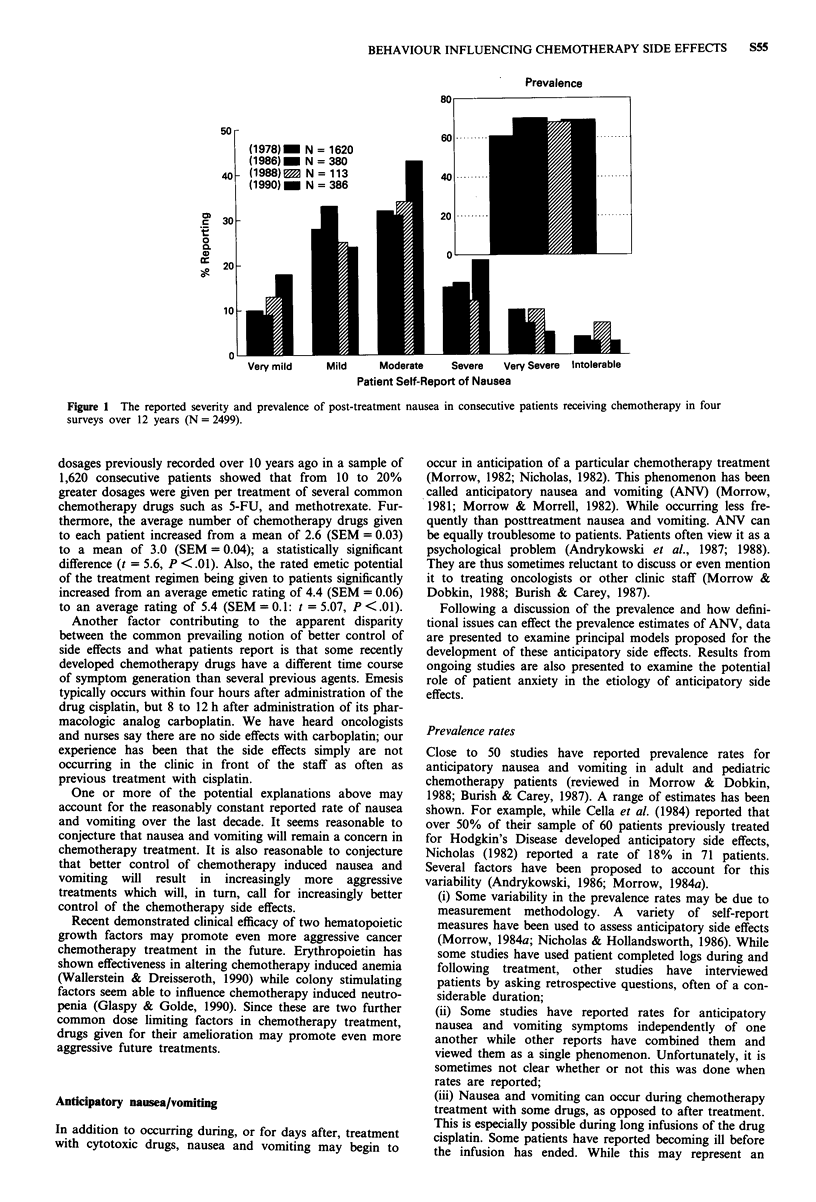
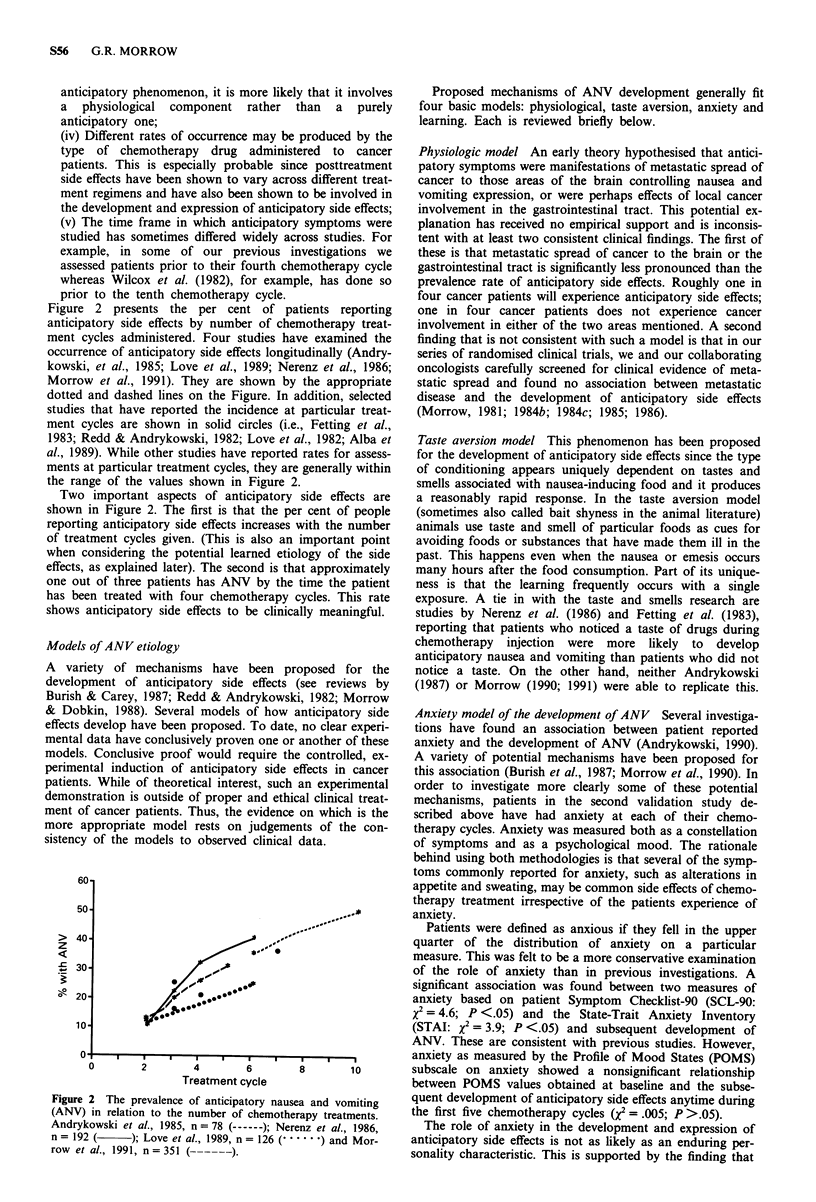
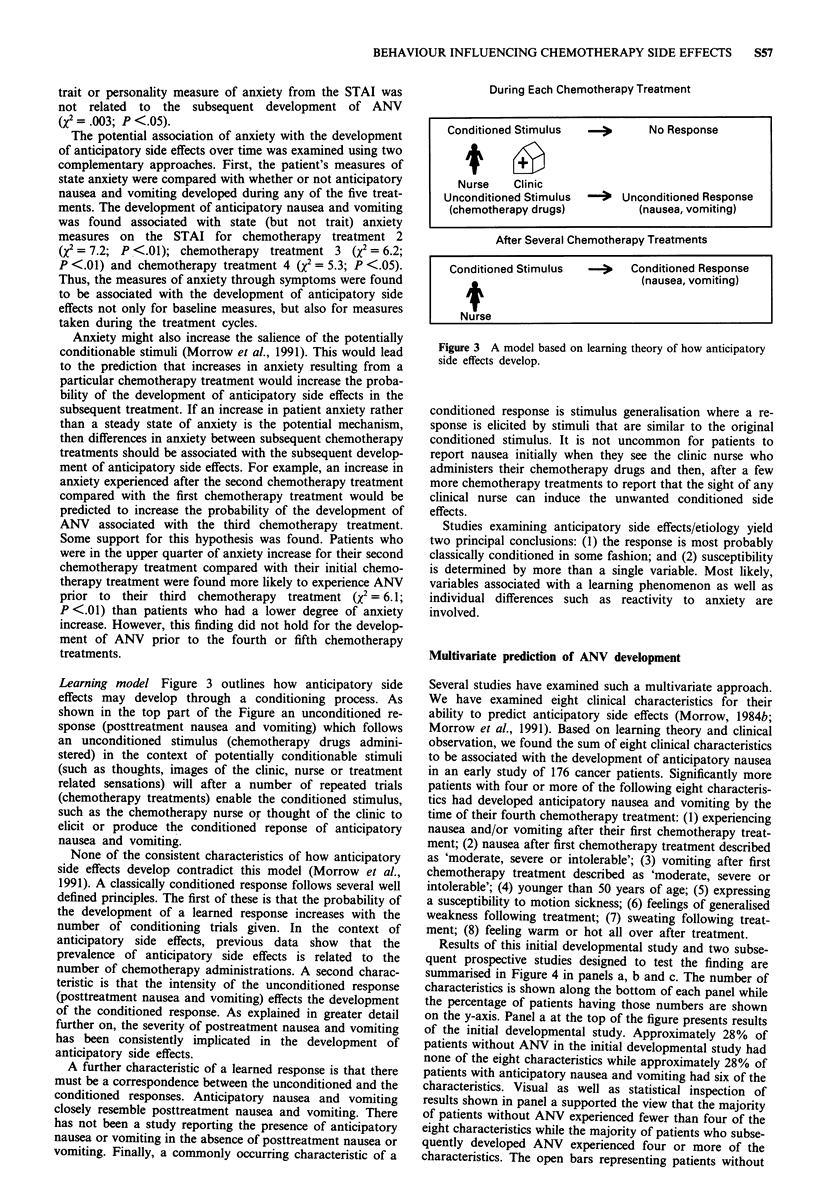
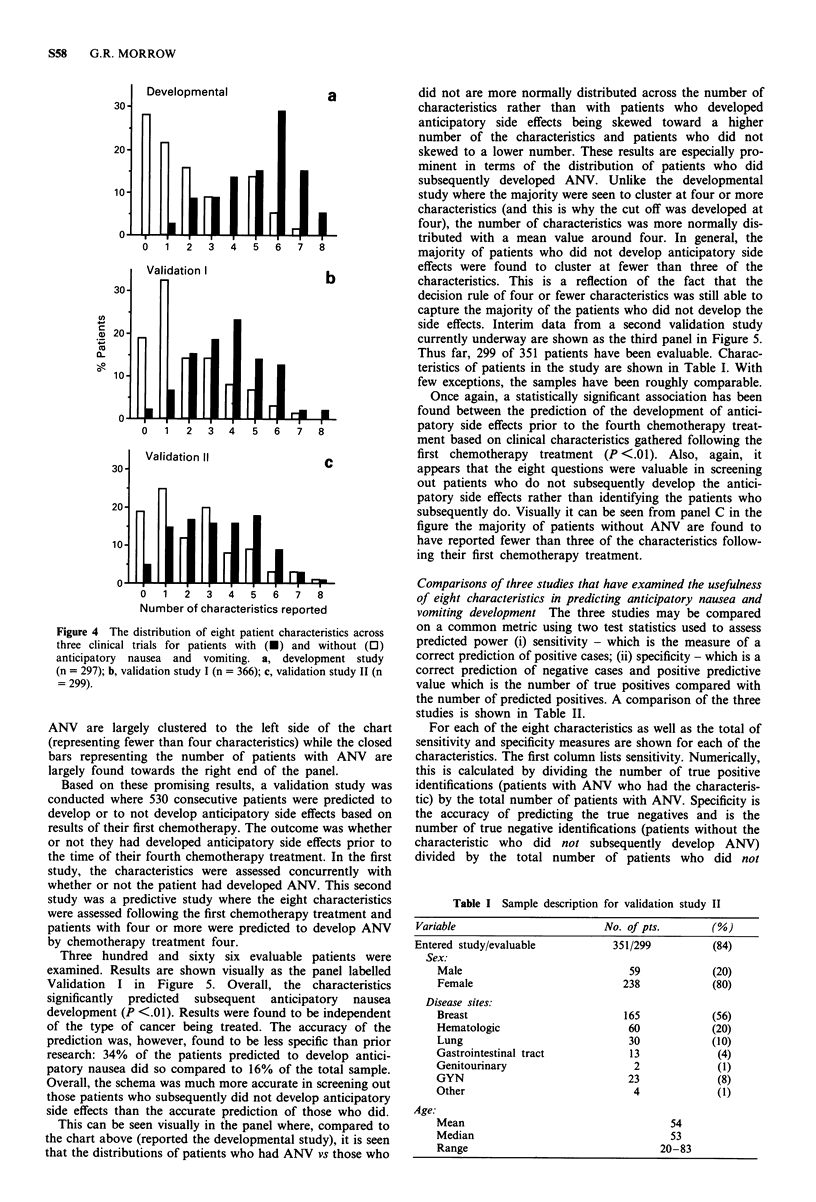
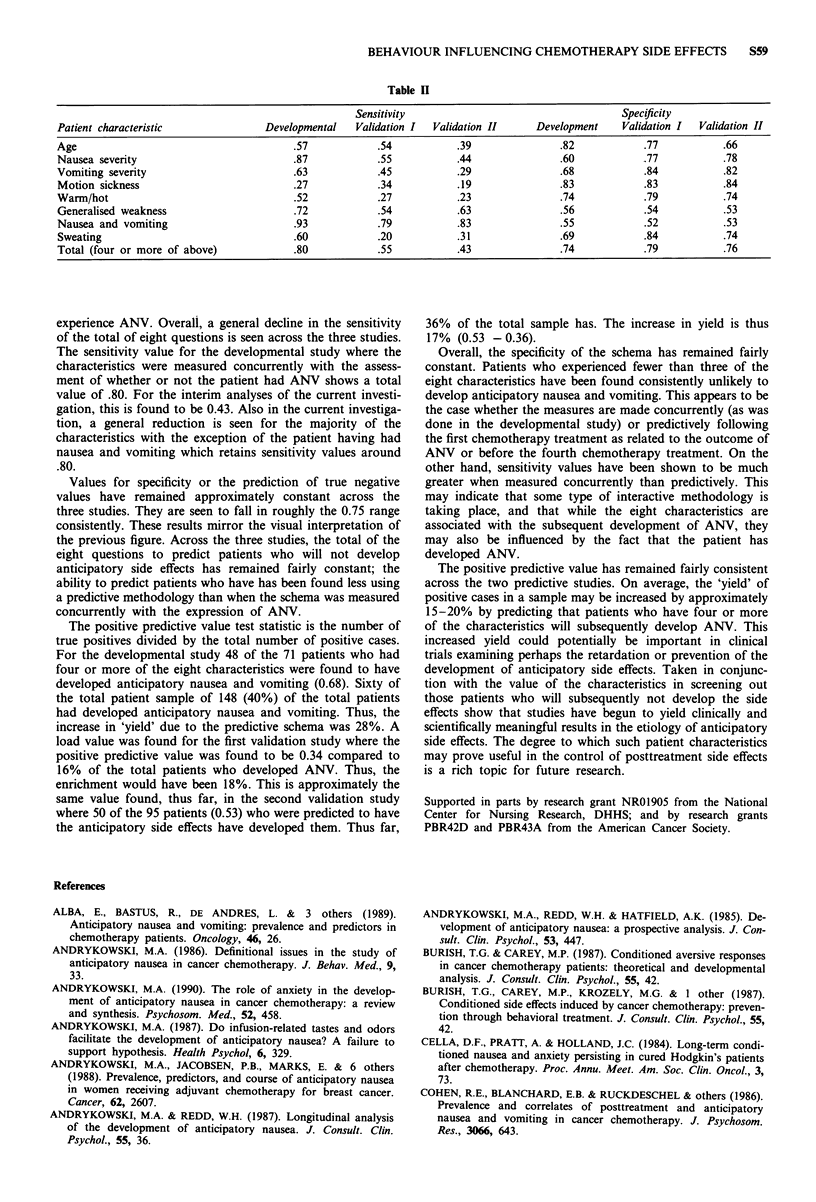
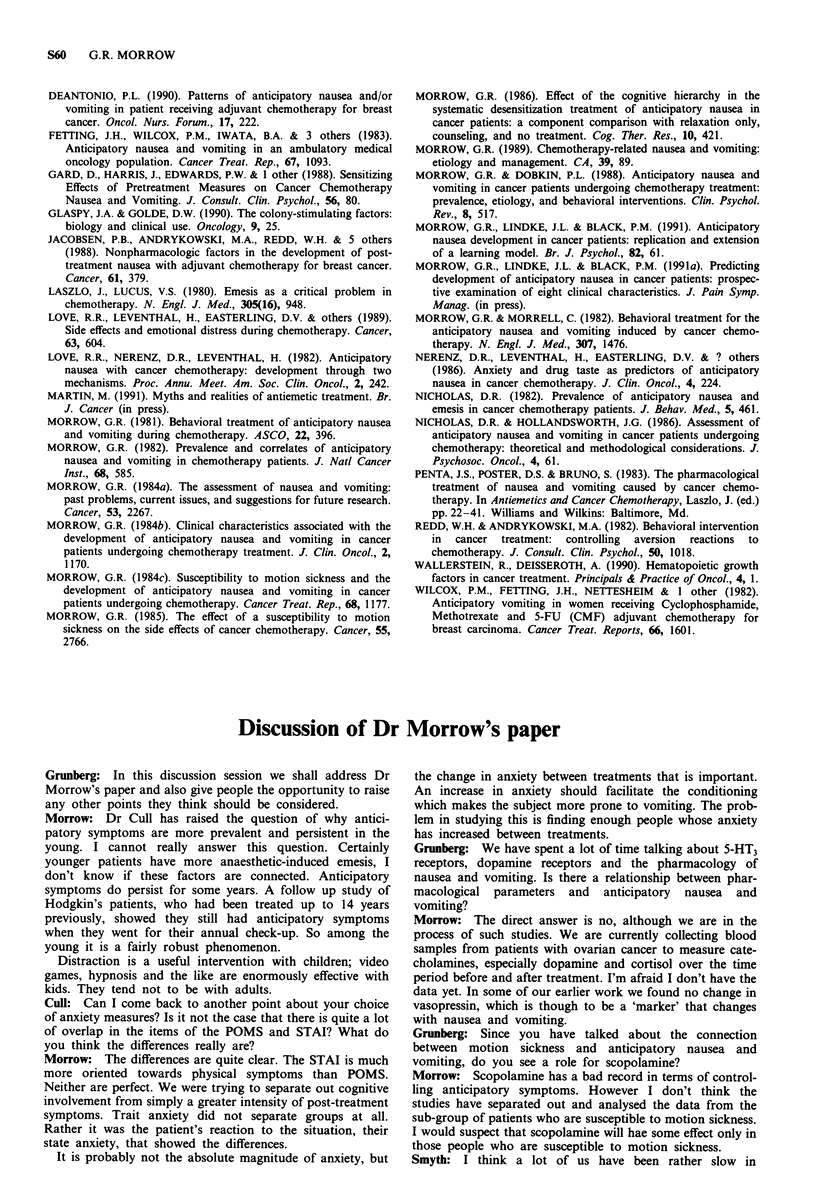
Selected References
These references are in PubMed. This may not be the complete list of references from this article.
- Andrykowski M. A. Definitional issues in the study of anticipatory nausea in cancer chemotherapy. J Behav Med. 1986 Feb;9(1):33–41. doi: 10.1007/BF00844642. [DOI] [PubMed] [Google Scholar]
- Andrykowski M. A. Do infusion-related tastes and odors facilitate the development of anticipatory nausea? A failure to support hypothesis. Health Psychol. 1987;6(4):329–341. doi: 10.1037//0278-6133.6.4.329. [DOI] [PubMed] [Google Scholar]
- Andrykowski M. A., Jacobsen P. B., Marks E., Gorfinkle K., Hakes T. B., Kaufman R. J., Currie V. E., Holland J. C., Redd W. H. Prevalence, predictors, and course of anticipatory nausea in women receiving adjuvant chemotherapy for breast cancer. Cancer. 1988 Dec 15;62(12):2607–2613. doi: 10.1002/1097-0142(19881215)62:12<2607::aid-cncr2820621226>3.0.co;2-s. [DOI] [PubMed] [Google Scholar]
- Andrykowski M. A., Redd W. H., Hatfield A. K. Development of anticipatory nausea: a prospective analysis. J Consult Clin Psychol. 1985 Aug;53(4):447–454. doi: 10.1037//0022-006x.53.4.447. [DOI] [PubMed] [Google Scholar]
- Andrykowski M. A., Redd W. H. Longitudinal analysis of the development of anticipatory nausea. J Consult Clin Psychol. 1987 Feb;55(1):36–41. doi: 10.1037//0022-006x.55.1.36. [DOI] [PubMed] [Google Scholar]
- Andrykowski M. A. The role of anxiety in the development of anticipatory nausea in cancer chemotherapy: a review and synthesis. Psychosom Med. 1990 Jul-Aug;52(4):458–475. doi: 10.1097/00006842-199007000-00008. [DOI] [PubMed] [Google Scholar]
- Burish T. G., Carey M. P., Krozely M. G., Greco F. A. Conditioned side effects induced by cancer chemotherapy: prevention through behavioral treatment. J Consult Clin Psychol. 1987 Feb;55(1):42–48. doi: 10.1037//0022-006x.55.1.42. [DOI] [PubMed] [Google Scholar]
- Cohen R. E., Blanchard E. B., Ruckdeschel J. C., Smolen R. C. Prevalence and correlates of posttreatment and anticipatory nausea and vomiting in cancer chemotherapy. J Psychosom Res. 1986;30(6):643–654. doi: 10.1016/0022-3999(86)90098-x. [DOI] [PubMed] [Google Scholar]
- Fetting J. H., Wilcox P. M., Iwata B. A., Criswell E. L., Bosmajian L. S., Sheidler V. R. Anticipatory nausea and vomiting in an ambulatory medical oncology population. Cancer Treat Rep. 1983 Dec;67(12):1093–1098. [PubMed] [Google Scholar]
- Glaspy J. A., Golde D. W. The colony-stimulating factors: biology and clinical use. Oncology (Williston Park) 1990 Sep;4(9):25–34. [PubMed] [Google Scholar]
- Jacobsen P. B., Andrykowski M. A., Redd W. H., Die-Trill M., Hakes T. B., Kaufman R. J., Currie V. E., Holland J. C. Nonpharmacologic factors in the development of posttreatment nausea with adjuvant chemotherapy for breast cancer. Cancer. 1988 Jan 15;61(2):379–385. doi: 10.1002/1097-0142(19880115)61:2<379::aid-cncr2820610230>3.0.co;2-e. [DOI] [PubMed] [Google Scholar]
- Laszlo J., Lucas V. S., Jr Emesis as a critical problem in chemotherapy. N Engl J Med. 1981 Oct 15;305(16):948–949. doi: 10.1056/NEJM198110153051609. [DOI] [PubMed] [Google Scholar]
- Love R. R., Leventhal H., Easterling D. V., Nerenz D. R. Side effects and emotional distress during cancer chemotherapy. Cancer. 1989 Feb 1;63(3):604–612. doi: 10.1002/1097-0142(19890201)63:3<604::aid-cncr2820630334>3.0.co;2-2. [DOI] [PubMed] [Google Scholar]
- Morrow G. R. Chemotherapy-related nausea and vomiting: etiology and management. CA Cancer J Clin. 1989 Mar-Apr;39(2):89–104. doi: 10.3322/canjclin.39.2.89. [DOI] [PubMed] [Google Scholar]
- Morrow G. R. Clinical characteristics associated with the development of anticipatory nausea and vomiting in cancer patients undergoing chemotherapy treatment. J Clin Oncol. 1984 Oct;2(10):1170–1176. doi: 10.1200/JCO.1984.2.10.1170. [DOI] [PubMed] [Google Scholar]
- Morrow G. R., Lindke J., Black P. M. Anticipatory nausea development in cancer patients: replication and extension of a learning model. Br J Psychol. 1991 Feb;82(Pt 1):61–72. doi: 10.1111/j.2044-8295.1991.tb02382.x. [DOI] [PubMed] [Google Scholar]
- Morrow G. R. Methodology in behavioral and psychosocial cancer research. The assessment of nausea and vomiting. Past problems, current issues and suggestions for future research. Cancer. 1984 May 15;53(10 Suppl):2267–2280. [PubMed] [Google Scholar]
- Morrow G. R., Morrell C. Behavioral treatment for the anticipatory nausea and vomiting induced by cancer chemotherapy. N Engl J Med. 1982 Dec 9;307(24):1476–1480. doi: 10.1056/NEJM198212093072402. [DOI] [PubMed] [Google Scholar]
- Morrow G. R. Prevalence and correlates of anticipatory nausea and vomiting in chemotherapy patients. J Natl Cancer Inst. 1982 Apr;68(4):585–588. [PubMed] [Google Scholar]
- Morrow G. R. Susceptibility to motion sickness and the development of anticipatory nausea and vomiting in cancer patients undergoing chemotherapy. Cancer Treat Rep. 1984 Sep;68(9):1177–1178. [PubMed] [Google Scholar]
- Morrow G. R. The effect of a susceptibility to motion sickness on the side effects of cancer chemotherapy. Cancer. 1985 Jun 15;55(12):2766–2770. doi: 10.1002/1097-0142(19850615)55:12<2766::aid-cncr2820551207>3.0.co;2-7. [DOI] [PubMed] [Google Scholar]
- Nerenz D. R., Leventhal H., Easterling D. V., Love R. R. Anxiety and drug taste as predictors of anticipatory nausea in cancer chemotherapy. J Clin Oncol. 1986 Feb;4(2):224–233. doi: 10.1200/JCO.1986.4.2.224. [DOI] [PubMed] [Google Scholar]
- Nicholas D. R. Prevalence of anticipatory nausea and emesis in cancer chemotherapy patients. J Behav Med. 1982 Dec;5(4):461–463. doi: 10.1007/BF00845373. [DOI] [PubMed] [Google Scholar]
- Redd W. H., Andrykowski M. A. Behavioral intervention in cancer treatment: controlling aversion reactions to chemotherapy. J Consult Clin Psychol. 1982 Dec;50(6):1018–1029. doi: 10.1037//0022-006x.50.6.1018. [DOI] [PubMed] [Google Scholar]
- Wilcox P. M., Fetting J. H., Nettesheim K. M., Abeloff M. D. Anticipatory vomiting in women receiving cyclophosphamide, methotrexate, and 5-FU (CMF) adjuvant chemotherapy for breast carcinoma. Cancer Treat Rep. 1982 Aug;66(8):1601–1604. [PubMed] [Google Scholar]


